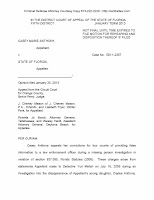As if things were not confused enough, the Florida Supreme Court has approved new lawyer advertising rules that have been in the works for a long time, with two modifications, and over the dissents of Justices Parienti and Canady.
Here's a taste of the majority opinion:
Next, we address a concern expressed by commenters regarding the proposed requirement in new rules 4-7.13 and 4-7.14 that certain statements made in attorney advertisements must be “objectively verifiable.” Commenters assert that this requirement is unclear. We disagree. If the attorney can show, by objective facts, that the statement is true, then he has presented an objectively verifiable statement in the advertisement. On the other hand, making a subjective statement such as “the best trial lawyer in Florida” is a misleading statement that fails to meet the requirement because it is neither objective nor verifiable. The advertising statement must be supported by verifiable facts.So now you need to assign an associate at your law firm to figure out what this all means and how this applies to your website.
Justice Pariente's dissent makes the distinction between traditional lawyer advertising and lawyer websites:
In my view, the potential harms and dangers presented by traditional advertising require closer oversight, whereas the inclusion of lawyers’ websites and information upon request as part of the lawyer advertising restrictions is unnecessary and has the potential to result in a chilling effect. For these reasons, I would exempt websites and information upon request from advertising restrictions, and I question whether the entire revamped approach to regulating traditional forms of advertising is a beneficial change.
. . . .
In contrast to the surveys about the effects on the public of traditional lawyer advertising, there is absolutely no evidence that lawyers’ websites have contributed to the decline in the way the public views lawyers—or been the subject of abuse by the thousands of lawyers who utilize websites. It is clear from the date of these surveys that websites were not considered. Rather, a well-done and comprehensive website could give a potential client an abundance of meaningful information from which to make a decision as to that particular lawyer or law firm.Or a good press release!


































